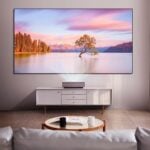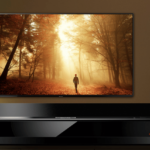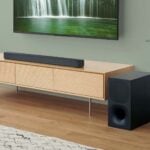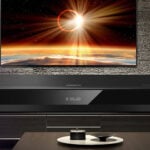Home Theater
Entertainment & Streaming Content
Physical Media
Home Theater Equipment and Hardware
Other Diversions
Bargains and Classifieds
Home Theater Forum
You are using an out of date browser. It may not display this or other websites correctly.
You should upgrade or use an alternative browser.
You should upgrade or use an alternative browser.
Question about biwiring vs single wiring (1 Viewer)
- Thread starter Kevin C Brown
- Start date
More options
Who Replied?Kevin C Brown
Senior HTF Member
- Joined
- Aug 3, 2000
- Messages
- 5,726
Cool. I am learning a lot...
Chu Gai
Senior HTF Member
- Joined
- Jun 29, 2001
- Messages
- 7,270
Now all you've got to do is determine whether you could reliably hear the difference if the speakers were biwired or jumpered  That, IMHO, is when it's worth digging into the theoretical and engineering underpinnings. If you think about it, that's the game that the companies that're pushing biwiring cables, are playing. They're well aware that a significant amount of speaker companies have extra binding posts. They're aware that a lot of people assume the reason for that is because there are audible improvements. So, on their websites you'll find theoretical explanations of what's going on. Maybe they'll be like the one that Bruce stated. Maybe it'll be something else like quantum mechanics, magnetic fields, etc. But whatever it is, it'll sound good. And people get to thinking...hmmmm, if it can be explained, and even if I don't understand it, the fact that there's a white paper must mean that it's true. Couple that with people's flawed approaches and a smattering of testimonials. And regardless of what theoretical position you want to take, you'll find a forum, maybe audioasylum, where you'll find someone or a group that buys into it. And why not? After all, they sell two cables. It's kind of like pharmacies cashing in on magnetic shoe inserts and homeopathic preparations. There's money to be made.
That, IMHO, is when it's worth digging into the theoretical and engineering underpinnings. If you think about it, that's the game that the companies that're pushing biwiring cables, are playing. They're well aware that a significant amount of speaker companies have extra binding posts. They're aware that a lot of people assume the reason for that is because there are audible improvements. So, on their websites you'll find theoretical explanations of what's going on. Maybe they'll be like the one that Bruce stated. Maybe it'll be something else like quantum mechanics, magnetic fields, etc. But whatever it is, it'll sound good. And people get to thinking...hmmmm, if it can be explained, and even if I don't understand it, the fact that there's a white paper must mean that it's true. Couple that with people's flawed approaches and a smattering of testimonials. And regardless of what theoretical position you want to take, you'll find a forum, maybe audioasylum, where you'll find someone or a group that buys into it. And why not? After all, they sell two cables. It's kind of like pharmacies cashing in on magnetic shoe inserts and homeopathic preparations. There's money to be made.
In your argument you are ignoring the important difference between simple DC resistance (DCR) and impedance (frequency dependant resistance - the resistance to an AC signal). The wire and specifically the crossovers are all affected by frequency, making the calculations a little more difficult.You are correct Bruce... I am sure I over-simplified things. As an ME, we really did not delve too deeply into Alternating Current and stuck pretty much to DC examples, for simplicity I am sure. Other than neglecting the differences in AC vs. DC, it seems my biggest error was to neglect the larger impedance the woofer itself presents to the amplifier relative to the tweeter. But I do love "trying" to understand all the technical jargon. I think if I read over everything another dozen times, it might just start to sink in. And I am surprised at how interesting all this stuff is... maybe being an EE wouldn't be all that bad ?!?!
One question though:
If I were to eliminate the bi-wiring, is there any advantage to putting the LF input first in series or vice-versa ? How do you have your speaker wires arranged ? (I guess that is two questions).
brucek
Second Unit
- Joined
- Dec 29, 1998
- Messages
- 335
If I were to eliminate the bi-wiring, is there any advantage to putting the LF input first in series or vice-versa ?I like to plug into the LF driver, but it's not anything to get fussed about.
I use stranded 9 gauge with expandable banana plugs...
brucek
Kevin C Brown
Senior HTF Member
- Joined
- Aug 3, 2000
- Messages
- 5,726
Bruce-
1) Any difference between running single wire to one set of binding posts (with the jumpers in place), vs "bi-wired" with the jumpers in place?
2) Any thoughts on twisted pair? =>
http://www.canare.com/speakercabletechnote.html
1) Any difference between running single wire to one set of binding posts (with the jumpers in place), vs "bi-wired" with the jumpers in place?
2) Any thoughts on twisted pair? =>
http://www.canare.com/speakercabletechnote.html
brucek
Second Unit
- Joined
- Dec 29, 1998
- Messages
- 335
Any thoughts on twisted pair?There are some high end speaker cables that use this interweaving technique of the small individual insulated conductors so they're able to boast slightly better inductive values. So, instead of the wires running parallel, they cross over each other at angles that tend to reduce the induction between the strands. You'll see inductive figures per foot that are many times better than regular zip.
Usually this technique also causes the capacitance per foot to rise by about the same factor, but that's not a problem, we're not concerned about parallel reactance in this low impedance interface - it's only important in a high impedance connection.
Either way, the important point is to choose speaker wire that has a low inductance per foot spec whether it's twisted or not.
brucek
this article, link provided by another forum member in another thread in this tweaks forum, says the same thing about speaker (high voltage low impedance) connections. Better to use a few smaller gauge individually insulated conductors in whatever geometry than a single large gauge conductor for speaker level connections.
Kevin C Brown
Senior HTF Member
- Joined
- Aug 3, 2000
- Messages
- 5,726
Cool, thanks.
Kevin. W
Screenwriter
- Joined
- Oct 27, 1999
- Messages
- 1,534
If I wanted to Bi-wire my speakers would it be okay to use 16g or should I go higher? Only looking at runs of less than 10ft. Also is it okay to put both ends of the wire of one pair into a banana plug(Screw down) for attachment to my amp?
Kevin
Kevin
brucek
Second Unit
- Joined
- Dec 29, 1998
- Messages
- 335
Also is it okay to put both ends of the wire of one pair into a banana plug(Screw down) for attachment to my amp?Yep, make sure the wire is freshly stripped and that the screw holds down tightly on the two wires properly.
brucek
Kevin. W
Screenwriter
- Joined
- Oct 27, 1999
- Messages
- 1,534
One more question. If I'm going to Bi-wire should the runs of speaker wire be the same length for the front soundstage(FL: 1ft, FR:7ft, Center: 4ft from amp, so should I make all runs say 8ft). I know the runs should be the same length going from the amps +/- to both +/- terminals on the speakers.
Kevin
Kevin
brucek
Second Unit
- Joined
- Dec 29, 1998
- Messages
- 335
Speaker cable length and phase differences? Don't worry too much about it. Electricity travels near the speed of light in a wire depending on its velocity factor, but that's not important here. This speed is approximated to about a nanosecond a foot. The accepted explanation would be that if you had one speaker wire 50 feet longer than the other, then that signal would arrive about 50 nanoseconds later than the other. Well, this is about 1000 times less than human hearing can even begin to detect, so don't worry about the lengths of your cables and phase differences.
In practice though, I think it's convenient to have my front speaker wires long enough to make positional changes and interchange cables if necessary. But if you want to have one a foot long and the other seven feet long, you're not likely to notice any change in soundstage......
brucek
In practice though, I think it's convenient to have my front speaker wires long enough to make positional changes and interchange cables if necessary. But if you want to have one a foot long and the other seven feet long, you're not likely to notice any change in soundstage......
brucek
Users who are viewing this thread
Total: 1 (members: 0, guests: 1)
Sign up for our newsletter
and receive essential news, curated deals, and much more
Latest Articles
-
 Best Home Theater Projectors for 2024
Best Home Theater Projectors for 2024- Started by: Martin Dew
-
 The Best 4k Blu-Ray Players for 2024
The Best 4k Blu-Ray Players for 2024- Started by: Martin Dew
-
 Home Theater Forum’s Best Soundbars of 2023
Home Theater Forum’s Best Soundbars of 2023- Started by: Martin Dew
-
 Home Theater Prime Day Deals 2023
Home Theater Prime Day Deals 2023- Started by: John
Forum statistics
- Threads
- 357,016
- Messages
- 5,128,505
- Members
- 144,242
- Latest member
- acinstallation921
- Recent bookmarks
- 0

